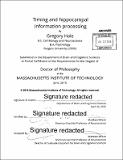Timing and hippocampal information processing
Author(s)
Hale, Gregory (Gregory John)
DownloadFull printable version (11.32Mb)
Other Contributors
Massachusetts Institute of Technology. Department of Brain and Cognitive Sciences.
Advisor
Matthew Wilson.
Terms of use
Metadata
Show full item recordAbstract
Timing is a key component in hippocampal encoding of space. I will discuss three lines of work related to this theme. First, I will describe the fine-timescale characteristics of single neurons in hippocampal subregion CAl, where theta oscillations organize groups of neurons into orderly sequences. While theta was once thought to be synchronized throughout CAl, it was recently shown instead to be offset in time along the long axis of the hippocampus. Considering distant pairs of neurons, our fundamental sequence spiking property may instead be systematically staggered by these offsets in the rhythms that pace them. I tested the impact of theta wave time offsets by recording place cell spike sequences from groups of neurons in distant parts of CAl, and found that place cell sequences more closely coordinate with each other than the underlying theta oscillations do. In regions that differ from one another by 13 milliseconds of theta delay, place cell sequences are typically aligned to within 5 milliseconds. This raises the possibility that theta wave offsets serve another purpose, perhaps timing the communication with brain areas connected to different parts of CAl, while compensatory mechanisms are in place to preserve the fine temporal alignment of place cell spatial information. Second, I will describe a tool for closed-loop experiments using information decoded from hippocampal ensembles. Place cell activity is typically extracted and analyzed only after an experiment has ended. But interrogating the timing of hippocampal information, enhancing or interfering with it, requires decoding that information immediately. I will discuss some of the difficulties and the eventual implementation of a system capable of sequence time-scale position decoding and then survey the future experimental applications.
Description
Thesis: Ph. D., Massachusetts Institute of Technology, Department of Brain and Cognitive Sciences, 2015. Cataloged from PDF version of thesis. Includes bibliographical references (pages 88-100).
Date issued
2015Department
Massachusetts Institute of Technology. Department of Brain and Cognitive SciencesPublisher
Massachusetts Institute of Technology
Keywords
Brain and Cognitive Sciences.